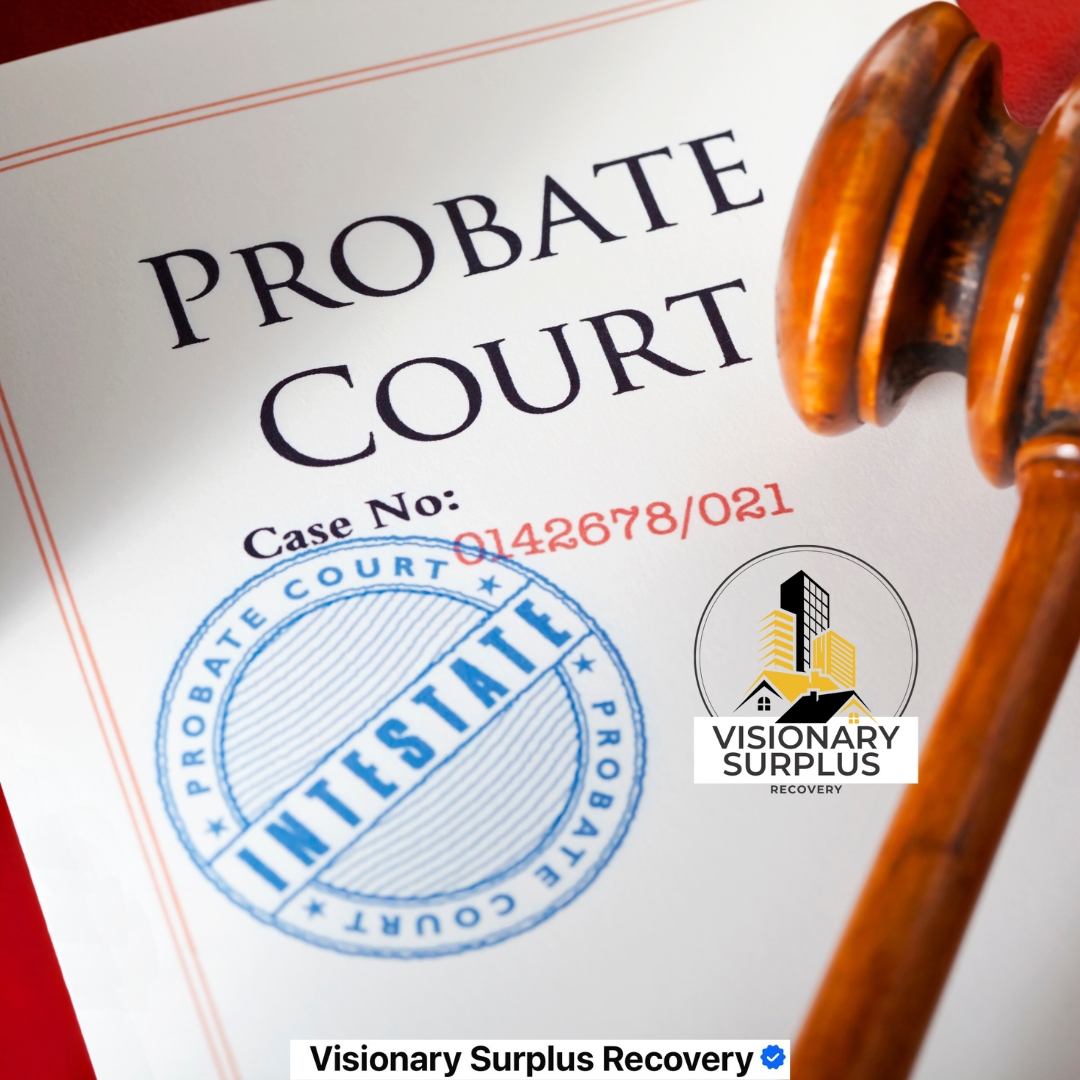Surplus Funds and Probate: What Florida Heirs Need to Know
Surplus Funds and Probate: What Florida Heirs Need to Know
If a loved one has passed away and their property was sold in a foreclosure or tax deed auction, there may be surplus funds left over from that sale. These funds don’t automatically go to the state — but if the former owner is deceased, probate is often required before heirs can legally access the money.
So, how does probate intersect with surplus fund claims in Florida?
This guide explains everything heirs and beneficiaries need to know to protect their rights — and recover the money that may be legally theirs.
What Are Surplus Funds?
Surplus funds are the extra proceeds from a foreclosure or tax deed auction after all debts and liens on the property have been paid. For example:
The homeowner owed $100,000
The property sold for $135,000
The $35,000 difference (minus fees) is surplus — and potentially claimable by the owner or their estate
📧 intake@visionarysurplusrecovery.com
☎ (813) 859-6649 or text (813) 859-6649
Who Can Claim Surplus Funds?
Under Florida law, surplus funds may be claimed by:
The former property owner
An assignee or representative
A lienholder
If the owner is deceased: the heir(s) or personal representative of the estate
And this is where probate becomes critical.
What Is Probate and Why Is It Required?
Probate is the legal process through which a deceased person’s estate is formally administered. It’s how the courts determine:
Who the rightful heirs are
What assets exist (including surplus funds)
Who is authorized to collect and distribute them
Florida Clerks and courts will not release surplus funds to just anyone claiming to be a relative. They require:
Formal probate to be opened in the appropriate county
Court-issued documentation (like Letters of Administration) proving someone has legal authority to represent the estate
When Is Probate Required to Claim Surplus Funds?
Probate is usually required in the following cases:
The deceased person was the sole owner of the foreclosed property
No co-owners or surviving spouses remain
The surplus funds are significant (generally more than $20,000)
There are multiple heirs or disputed inheritance claims
In limited cases, such as when the estate is small, Florida allows a simplified probate process called Disposition Without Administration — but only under strict conditions.
Common Documents Required During Probate
To claim surplus funds as an heir or representative, you may need:
Certified death certificate of the property owner
Letters of Administration from the probate court
A copy of the will, if one exists
Your ID and relationship to the deceased
Court order approving disbursement of funds (if required)
If there are multiple heirs, the court may also require consents or waivers to ensure proper distribution.
What If There Are Multiple Heirs or Creditors?
Florida courts follow a specific priority in distributing surplus funds:
Lienholders (if any)
Estate administration costs (if paid from the surplus)
Heirs, as determined by the will or intestate laws (if no will exists)
If multiple heirs claim the funds, the court may hold a hearing or require formal agreement between parties. Disputes can prolong the process — so working with an experienced team can help prevent delays.
Do You Need a Lawyer for Probate and Surplus Funds?
In many cases, yes.
Especially if:
There’s no will
There are multiple heirs
Creditors are involved
The surplus is contested
You need to open formal probate
At Visionary Surplus Recovery, we work with licensed Florida attorneys who can handle probate and surplus recovery as one coordinated process. That way, you avoid the stress, court filings, and legal guesswork.
How We Help Heirs Claim Surplus Funds After a Death
Our team will:
Research whether surplus funds exist
Guide you through opening probate (if necessary)
Partner with attorneys to represent your estate in court
File all paperwork correctly and on time
Only collect a fee after funds are successfully recovered
Think You May Be Entitled to Surplus Funds?
If a loved one’s home was recently sold at auction, don’t let the funds get lost to red tape or delays. You may be legally entitled — but action must be taken.
📧 intake@visionarysurplusrecovery.com
☎ (813) 859-6649 or text (813) 859-6649
Disclaimer: This post is for informational purposes only and does not constitute legal advice. For personalized assistance, consult with a licensed Florida probate attorney.


